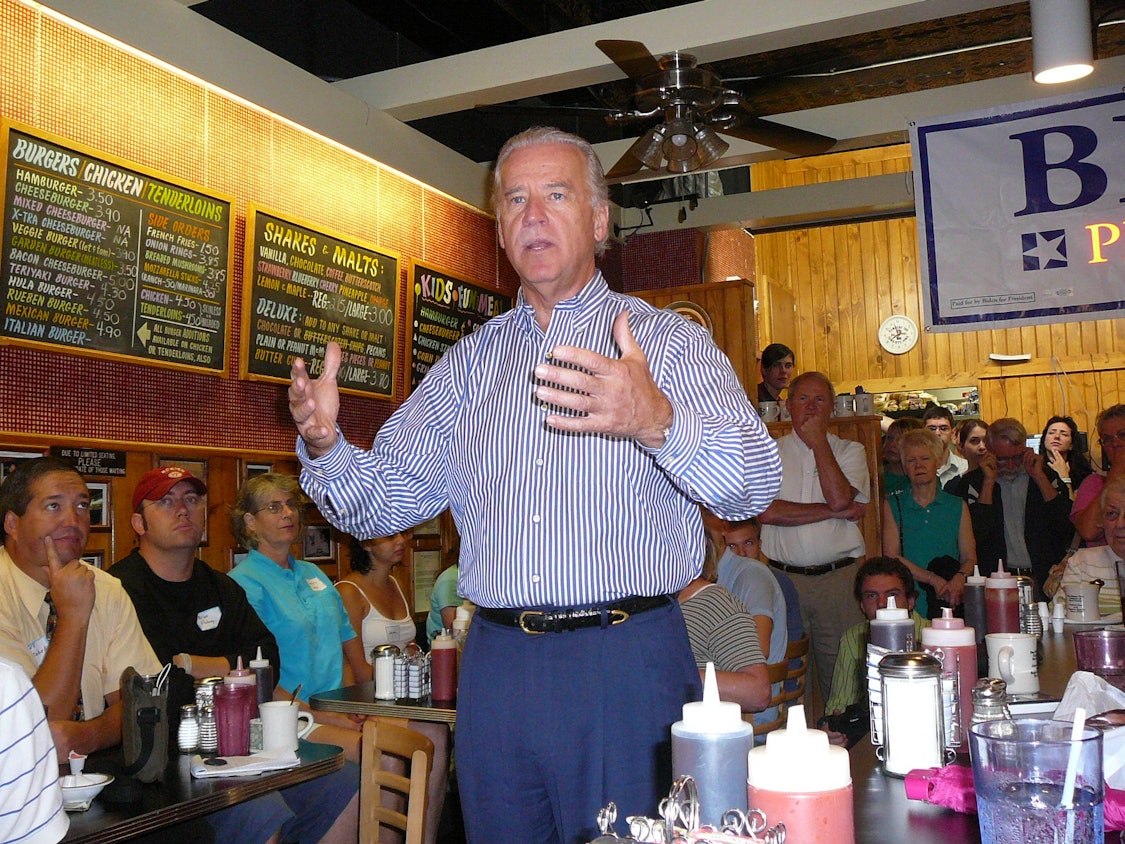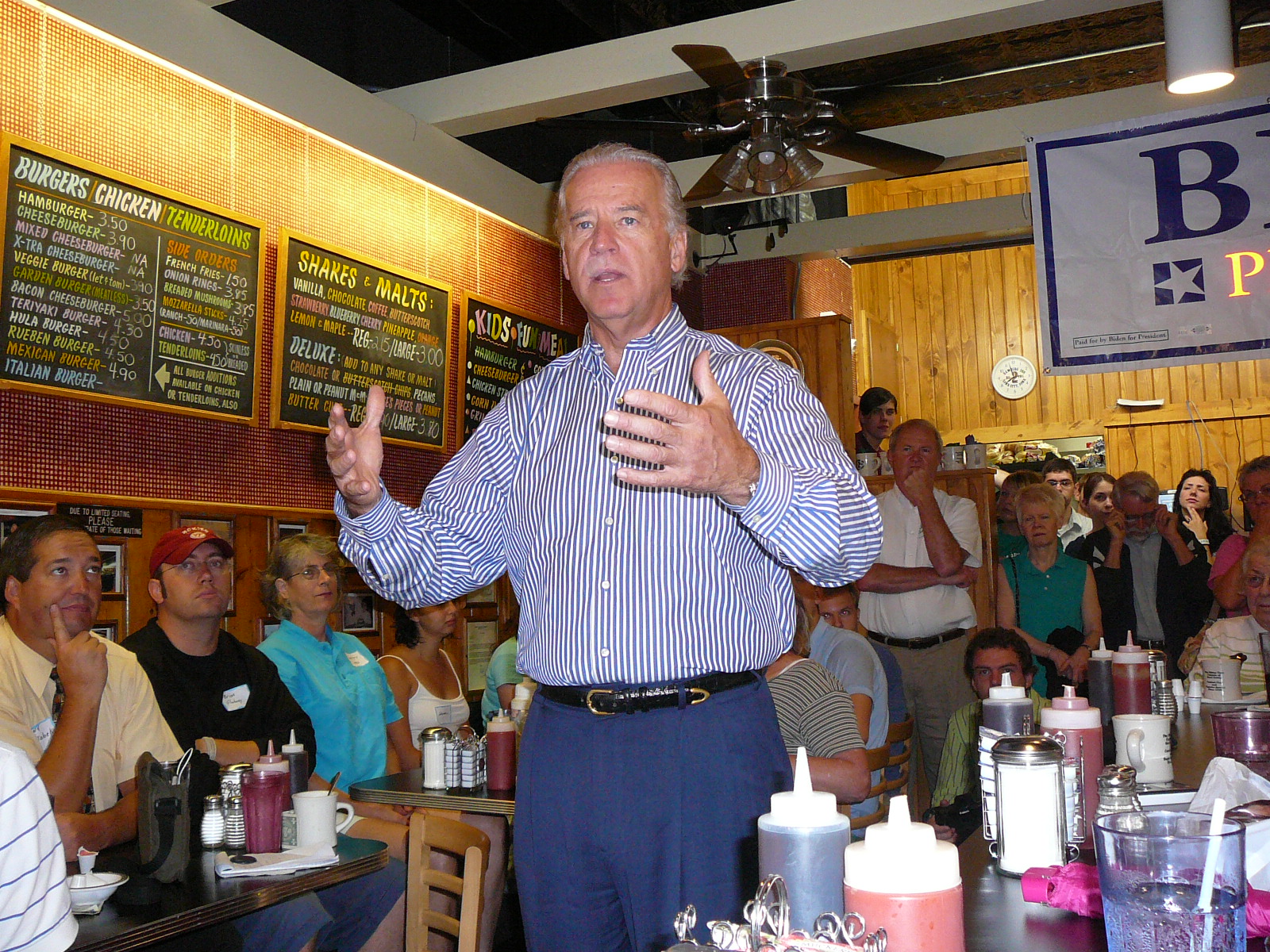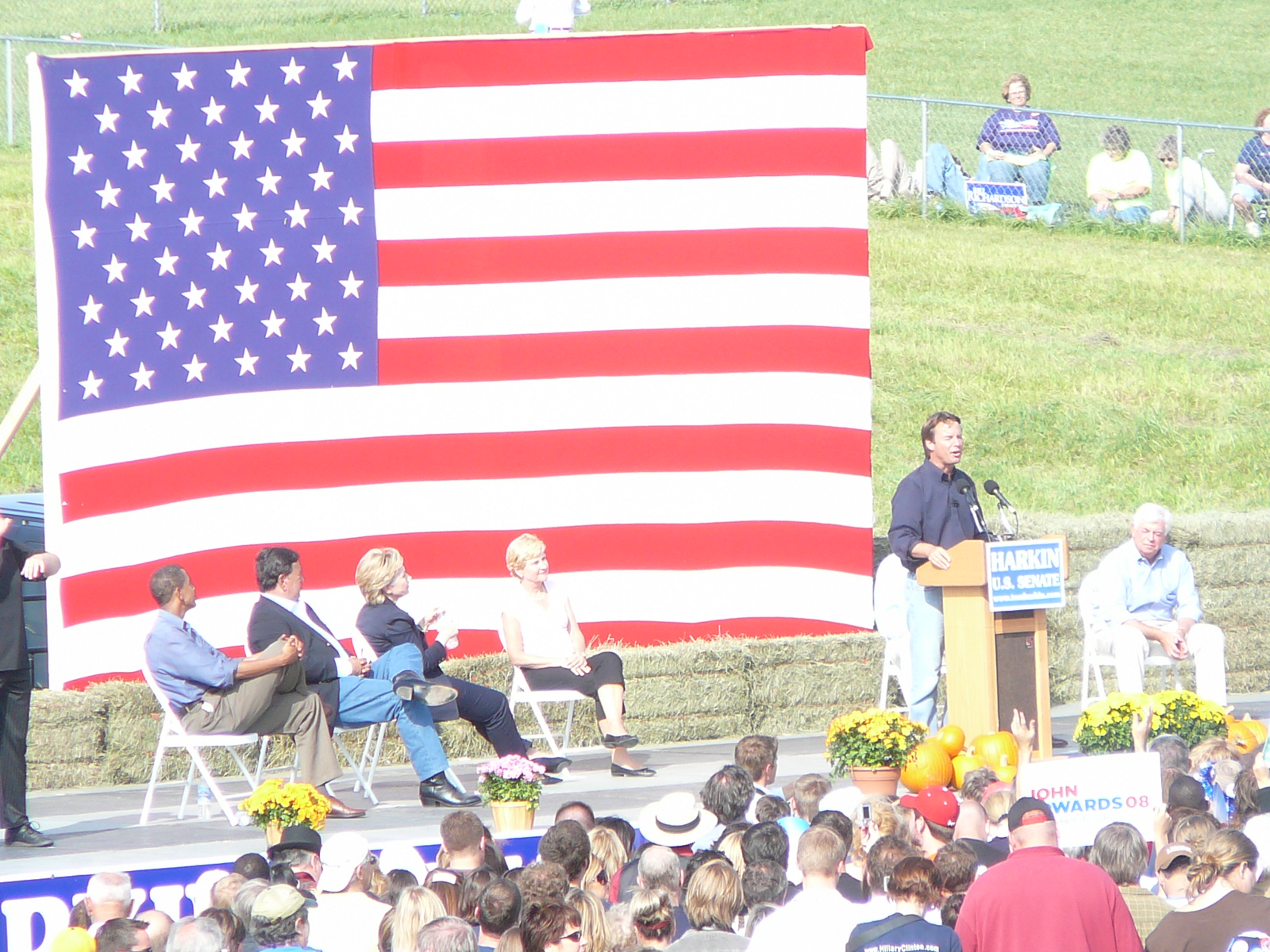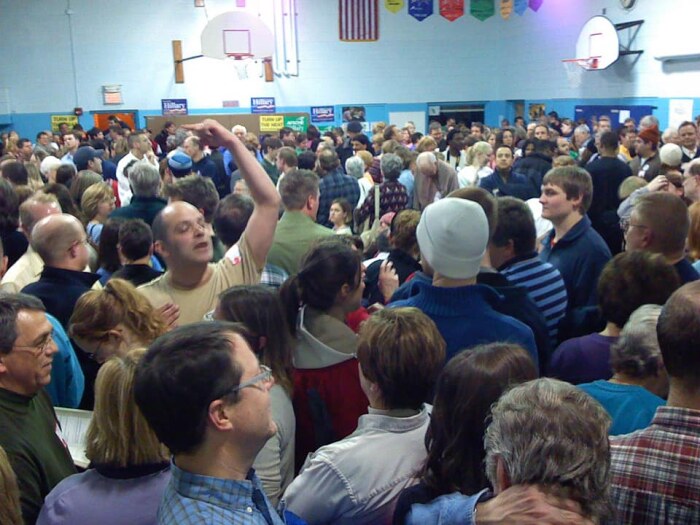John Deeth has volunteered for the Johnson County Democrats and been involved in caucus planning since 2004. He was the lead organizer for the Johnson County caucuses in 2016 and 2020. Deeth has also worked in the Johnson County Auditor’s Office since 1997.
As Iowa Democratic Party leaders struggle through the denial stage of the grieving process, they are clinging to a state law that supposedly privileges Iowa’s historic first place on the presidential nomination calendar.
In an email sent to party activists on the evening of December 1, soon after President Joe Biden announced his support for a Democratic nomination calendar that does not include Iowa among the early states, party chair Ross WIlburn wrote:
Our state law requires us to hold a caucus before the last Tuesday in February, and before any other contest. When we submit our delegate selection plan to the Rules and Bylaws Committee early next year, we will adhere to the State of Iowa’s legal requirements, and address compliance with DNC rules in subsequent meetings and hearings.
While the law itself is ridiculous—what if 49 other states pass the same law?—Iowa Republicans are also pushing the “state law” argument. In part they want to make the Democrats squirm. But also, Republicans have grounds for concern that if Democrats follow the new Democratic National Committee approved calendar, it will hurt the Iowa GOP’s chances of staying First on their side, which the Republican National Committee has approved for 2024.
The Iowa Democratic Party is in a jam. If we go along with the Republicans, the DNC penalties are draconian. There are strict restrictions against candidates campaigning in calendar breaking states, and there would be an automatic reduction by half in the state’s national convention delegation. Stricter sanctions could be imposed, including kicking the Iowa delegation entirely out of the convention.
And the DNC will not hesitate to impose the harshest punishments on Iowa. The president himself said, “Our party should no longer allow caucuses as part of our nominating process.” We learned in the Rules and Bylaws Committee discussion just how much other states hate our poor track record and our complicated process.
Unlike New Hampshire, which is also making loud threats to break the rules, we do not have two Democratic senators or swing-state status to protect us. We are the perfect state to make an example of. We are too weak within the national party to get away with breaking the calendar rules, and too weak within the state to get the law changed.
But we don’t need to. Iowa Democrats can both follow state law and be in compliance with the national calendar. It’s not hard; you just have to read the law.
Here’s what Iowa Code 43.4 actually says:
Delegates to county conventions of political parties and party committee members shall be elected at precinct caucuses held not later than the fourth Monday in February of each even-numbered year. The date shall be at least eight days earlier than the scheduled date for any meeting, caucus, or primary which constitutes the first determining stage of the presidential nominating process in any other state, territory, or any other group which has the authority to select delegates in the presidential nomination.
Despite the way both parties are spinning it, 43.4 does not say parties must conduct a presidential preference process at the caucus.
In fact, Republicans had a long tradition of not holding a presidential straw vote at their caucuses in years when their incumbent presidents were seeking re-election. They changed that policy in 2020, but Republicans did not hold a vote in 1984, 1992, or 2004. The decision was somewhat controversial in 1992, when Pat Buchanan won nearly 40 percent of the vote in the New Hampshire primary against President George H.W. Bush.
All 43.4 says is that parties have to elect their precinct level officers before any other state starts its presidential nomination process. The DNC only cares about how early Iowa is voting for president. No one cares when we elect Central Committee members and county convention delegates.
So Iowa Democrats should go ahead and do that—and only that.
The caucus date is uncertain, because New Hampshire is likely to insist on following its state law and hold the first primary a week before any other state. That will trigger Iowa Republicans to move their caucus date back. Iowa Democrats are just along for the ride (albeit willingly).
On whatever night the Republicans set, Democrats should have a mid-term style caucus to debate the platform and elect committee members and delegates. But it needs to be made clear that election as a delegate is in no way linked to presidential preference. The handful of activists who attend off-year caucuses, or who stayed late in presidential years after the hours-long nightmare of realignment, would attend.
So when do we get to vote for president?
In a December 6 email to county chairs, Wilburn outlined a few more details of the somewhat vague vote by mail plan he and Scott Brennan presented to the Rules and Bylaws Committee over the summer.
JANUARY 2, 2024
First day for the Iowa Democratic Party to receive requests by mail or online portal, and send preference cards to registered Iowa Democrats.
14-28 DAYS PRIOR TO THE IN-PERSON CAUCUS
IDP Chair opens the non-present participation period of the caucuses. Caucus-goers may return their preference cards by mail, in-person, or drop box. The non-present participation period will continue for at least 14 days. During this time, Democrats may continue to request a preference card.
5 DAYS PRIOR TO THE IN-PERSON CAUCUS
Last day to postmark or hand-return preference cards
1 DAY PRIOR TO THE IN-PERSON CAUCUS
Deadline for Iowa Democratic Party to receive mailed preference card (Note: this would likely be a Sunday, with no mail delivery)
CAUCUS DAY
The Iowa Democratic Party will release the raw caucus results by a time certain to the public. Caucus site coordinators will receive both the raw results and delegate allocation results for all precincts at their site, and announce the number of delegates to be elected for each candidate (or uncommitted) in each precinct.
One good thing that came from the calendar reform process, and from the survey the Iowa Democratic Party conducted over the summer, is that no one is continuing to defend the old “stand in a corner for three hours to vote” system. The reformers have already won that battle.
Many details need to be thought through before implementing a vote by mail system, and that work needs to start very soon. The process will also be expensive, which a financially weak party will need to address. But the vote by mail concept is a good framework.
The timeline simply needs to be moved into compliance with the new DNC calendar.
After the precinct caucuses, the traditional next step of the process is the county convention in March. That’s a perfect time, outside the early state window that we are no longer a part of. We can make the county convention the new centerpiece of the presidential preference process.
IDP should schedule the proposed 14 to 28 day vote by mail window to begin between Wednesday, February 28 and Friday, March 1, on whatever day the early state window is officially considered closed. We can then spend the month of March voting, which is a nice long early voting window like we used to have in this state.
Democrats should then announce the presidential preference vote results at each county convention, on Saturday, March 23 or 30. This creates actual news out of the convention, to whatever extent “Biden 99 percent, Uncommitted 1 percent” is news.
(One under-discussed aspect of the calendar change is that President Biden weighing in so strongly is an indicator that he is running for re-election, so the 2024 Democratic cycle is likely to be uncontested. That gives Iowa Democrats a low-key, low stakes cycle to work the bugs out of our new system before a contested 2028 cycle.)
County conventions can proceed to elect pledged congressional district and state convention delegates, based on the results of the preference vote announced that morning.
The Congressional district and state conventions would proceed much as they always have and elect pledged national delegates. And, with Iowa in compliance with the DNC calendar, those delegates would be seated at the national convention with full votes and no penalties.
This plan is very close to what IDP presented to Rules and Bylaws. The only thing that changes is the time frame of the mail in vote. The Republicans already set the precedent that we do not need to have a presidential vote at the caucuses and we can simply elect unpledged county convention delegates. Delaying the presidential voting to March not only complies with both state law and party rules, it preserves as much of the Democrats’ traditional caucus to convention process as possible, given our removal from the early state window. The only thing it does not preserve is First As We Have Known It.
Of course, all this assumes Iowa Democratic leaders want to comply with the DNC calendar. All indications are, they do not. Let’s be honest here. “Following state law” is just an excuse. The real concern is keeping the privileges of First: the command performance cattle call events, the year and a half of candidates and organizers blanketing the state, and most importantly to some, the personal phone calls from presidential candidates to key state players.
State law says we have to elect delegates and central committee members early. It does not say that South Of Grand donors have a constitutional right to have Kamala Harris and Pete Buttigeig’s cell phone numbers. It does not say that small county chairs have a right to be quoted in the New York Times. It does not say you have a right to collect selfies with presidential candidates. We did this to ourselves, over many cycles and with many mistakes.
Iowa Democrats are in the weakest position we have been since the pre-Harold Hughes dark ages. It’s not just First that we have lost—it’s the entire way we have done things for 50 years.
Every hour and dollar wasted on fighting a battle for First that is already lost is time and money not spent building for the future. First will be very hard to replace. But accepting the loss and accepting our diminished role in the nomination process is a necessary first step in the long hard fight toward winning back the state.
Top photo of the overcrowded 2008 caucus in Iowa City precinct 16 courtesy of David Shafer, published with permission.
Next two photos by John Deeth depict scenes Iowans won’t see in the future. Senator Joe Biden speaks at a packed Hamburg Inn in Iowa City in 2007:


Barack Obama, Bill Richardson, Hillary Clinton, Ruth Harkin, and Chris Dodd listen to John Edwards speak at the 2007 Harkin Steak Fry:




5 Comments
Has the National Democrtic party conceded Iowa?
I wonder if the national party has conceded Iowa. If so there is not much point in selecting delegates.
jsneff-1964 Mon 12 Dec 3:17 PM
This makes sense
John Deeth makes much more sense here than IDP’s proposal. I’d rather get rid of the caucuses altogether, but I can’t see the Republican Iowa legislature changing the law. Announcing before the County conventions works.
annbublitz@earthlink.net Tue 13 Dec 2:46 PM
Iowa has been vilified
Iowa is likely the most vilified state in the United States by progressives when it comes to farm and food issues, which, in the 21st century, have gone viral. The reason for it is the farm subsidy issue, (an issue convoluted by more than 30 farm subsidy myths, all of which tend to bash farmers,) in relation to other issues, like agriculture and the environment. Mark Bittman of the New York Times, (a 21st century newcomer to farm issues,) called Iowa “the ground zero” of these issues. Chellie Pingree, (a similar newcomer who has served in Congress only after the elimination of the core farm bill programs by Republicans, which ended in 1996,) has referred to Iowa as a place where the politicians are all dupes for agribusiness. These and many others no nothing about our history as the leading farm justice state, leading the fight against agribusiness domination over 5 decades prior to the “support” of these new comers who share our values, but who exclude us from their activities. This was all fueled by “The Harkin Compromise,” where Harkin switched away from supporting farmers and joined the Republicans, taking the various “Harkin Appointees” along with him. But Harkin’s imagined benefits for the Iowa Democratic Party never happened, but rather the reverse, with huge losses of the rural vote. Today many Democrats are not just angry at our farmer victims of agribusiness, they’re livid, out of ignorance of what really happened, out of being duped by the dominant narrative that blames the victims, not the exploiters, in stark contrast to Democratic Party values.
brad-wilson Wed 14 Dec 10:43 AM
A certain family of sibling farmers in my area...
…own a lot of land and are known for never doing any conservation except for the minimum they must do to qualify for the Farm Bill. Their priority is clear at drainage meetings — profit, no apparent concern for water quality. They mow their road ditches during nesting season, breaking Iowa law.
Am I supposed to regard them as victims? If so, what am I supposed to think about a few farmer and landowner friends who go well out of their way to do good farm conservation, including wildlife habitat, even though they don’t have a lot of land or money?
Apart from personal rural observations, following farm policy, and doing volunteer conservation work for years, I breathe drifting herbicide on my front steps every spring. I see the snirt from bare fields in winter. I’ve watched a farmer plow up a few acres of a prairie remnant that, it turned out, he didn’t own. I see local hot spots of soil erosion that could be fixed but never are. I’ve heard about a farmer who told his county Soil and Water Conservation District that he would need to be paid more than the cost of fixing a certain public-park-damaging water problem on his farm before he would even consider fixing it. I talked with a farmer/landowner who bulldozed a prairie pasture so it would qualify for CRP. Etc. Etc. Etc.
I’ll freely admit to not knowing much about the Iowa farm-politics history described above. But I do know something about Iowa’s current farm/environment realities. I know that many Iowa farmers actively support the Iowa Farm Bureau, which is the single biggest obstacle to Iowa conservation policy progress. And yes, I’m angry.
Thank you, Chris Jones at U of I, for your ag/environment blog. It is therapeutic as well as informative.
PrairieFan Thu 15 Dec 10:19 PM
Candidate dropouts after Iowa and New Hampshire
My take on this is that good candidates drop out because they can’t get funding if they do not do well in the early contests. We can fix this in Iowa by having all delegates to the county convention be uncommitted. We can tell the national party that if they don’t seat our delegation all 6 of our electoral votes will be Republican.
jsneff-1964 Wed 14 Dec 10:53 AM